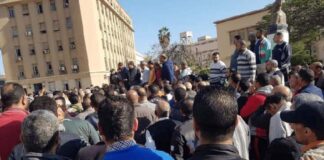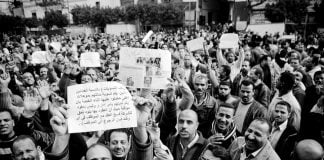Western leaders could not publicly reject the call for democracy in Egypt, but as the Mubarak regime teetered and fell they reached for the one ideological weapon they could deploy—the fear of Islamism.
In particular, they raised the spectre of power falling to the Muslim Brotherhood, Egypt’s biggest opposition party with up to a million members.
The irony, however, is that the Muslim Brotherhood is anything but a radical force, cautiously abstaining from the mobilisations in Tahrir Square until the waves of mass participation forced its hand.
So what is the Muslim Brotherhood, who constitutes its support base and what is its political agenda?
The Brotherhood was founded in 1928 by the Egyptian schoolteacher Hassan al-Banna. From the beginning, it was built around a contradiction. On the one hand, it opposed social injustice and imperialism: Britain was the de facto ruler of Egypt. On the other, it was wary of mass mobilisations that could spill over to threaten the privileges of Egyptian landowners and industrialists.
It aimed to resolve the tension through raising the call for the implementation of Islamic sharia law and the moral reinvigoration of the Muslim community. This allowed the teachers, public servants and engineers who constituted its core cadres to appeal to the poor, especially through the carrying out of charitable works, while gaining funding from wealthy Egyptians.
More militant minorities committed to military action emerged at various points from the 1940s onwards, leading to the Brotherhood being made illegal by President Nasser in the 1950s. But the central leadership rejected such tactics and anything that smacked of direct confrontation with the state.
Egyptian revolutionary socialists noted in 2005: “The Muslim Brotherhood are in a balancing act with the state … they will only mobilise in agreement with the state. For example, during the Gulf War, they organised a joint demonstration with the ruling National Democratic Party [Mubarak’s party].
“They see themselves as competing to run the state, something like the Turkish scenario, where the Islamic Party runs a mainstream capitalist government. They think that, if they are respectable enough, they can win things at the end of the day.”
Despite this approach, thousands of Muslim Brotherhood members have been jailed. As Jamie Allinson wrote in International Socialism, “As a result, the Brotherhood’s membership is continually embroiled in discussing the best strategic option to Islamise society”—whether through evangelism and social welfare, through participation in the political system, or through terrorism.
In some respects, the Muslim Brotherhood has modernised its practices. Where in the past they had been used by the regime as a counterweight to the left, in recent years they have dropped open hostility to socialists. They encourage women to vote and mobilise thousands in demonstrations.
Cautious approach to regime
But the tensions inherent in the Muslim Brotherhood project emerged once again this year. On January 19, the Muslim Brotherhood issued a statement in the wake of the Tunisian revolution. It repeated its core demands for the abolition of the State of Emergency, free and fair elections and social justice.
But it carefully avoided calling on Egyptians to rise up. On the contrary, it framed its message within a call for immediate reform so that Egypt would “not follow suit in Tunisia’s historical uprising”.
On February 6, it issued an explanation of why it was in negotiations with the Mubarak regime, insisting that it would not nominate a candidate for the presidency. Only on February 9 did it call for Mubarak to leave “for the sake of the country’s supreme interests and its national security”.
On the ground, however, younger members of the Muslim Brotherhood were part of the resistance in the streets alongside nationalists, socialists and other radicals.
As a revolutionary socialist put it: “The Muslim Brotherhood leadership is split. Some of them are in the square with us, others are talking to the regime and Suleiman. They are prepared to sell the revolution to gain legitimacy, but this risks splitting the Brotherhood.”
With Mubarak gone, the tensions within the Muslim Brotherhood will not disappear. There will be some who argue for accommodation with the military in order to win legality and influence in any new parliament. But there will be others who can be won to new struggles, to force out the remnants of the Mubarak regime, to fight for jobs and welfare, and for practical solidarity with the Palestinians.
The greater the self-activity of the Egyptian workers in coming months, the more chance there will be of winning Muslim Brotherhood supporters to help in deepening the revolution.
David Glanz





